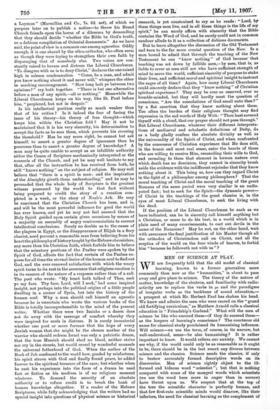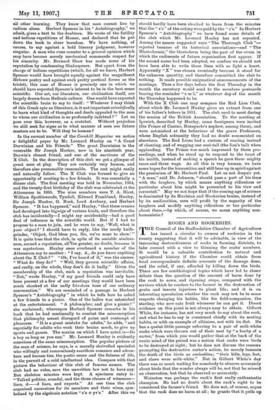MEN OP SCIENCE AT PLAY.
WE are frequently told that the old model of classical learning, known to a former generation more commonly than now as the " humanities," is about to pass away and give place to science. The theory of the nature Of matter, knowledge of the electron, and familiarity with radio- activity are to replace the verbs in pr and the paradigms of irregular verbs as the backbone of sound education,— a prospect at which Mr. Herbert Paul has shaken his head. We know and admire the men who were reared on the "grand old fortifying curriculum," as Matthew Arnold calls a classical education in " Friendship's Garland." What will the men of science be like who succeed them—if they do succeed them— as the keepers of learning's conscience ? The courteous old name for classical study proclaimed its humanising influence. Will science—we use the term, of course, in its narrow, but well-understood, sense—be also humanising ? It is rather important to know. It would relieve our anxiety. We cannot see why, if the world 'could only be as reasonable as it ought to be, there should be in the last resort any divorce between science and the classics. Science needs the classics, if only to bestow accurately formed descriptive words on its discoveries. Men of science rightly object to the ill- formed and hideous word " scientist "; but that is nothing compared with some of the mongrel words which scientists (we use the word here more in anger than in sorrow) have thrust upon us. We suspect that at the top of the tree the scientific character is perfectly human, and that few first-rate scientific minds would disavow, like their inferiors, the need-far classical learning as the complement of
all other learning. They know that man cannot live by radium alone. Herbert Spencer in hie "Autobiography," we admit, gives a text to the doubters. He wrote of the futility and tedious repetitions of Homer, and declared that he put down the book in sheer boredom. We have nothing, of course, to say against a bold literary judgment, however singular. A. man who rims counter to a general opinion which may have become merely mechanical commands respect for his sincerity. Mr. Bernard 'Shaw has made some of his reputation by condemning Shakespeare. But apart from the charge of tedious repetitions (which, for all we know, Herbert Spencer would have brought equally against the magnificent Hebrew poetry and against such pretty poetical forms as the triolet), this case of Homer is precisely one in which we should have expected Spencer's interest to be in the best sense scientific. Our art, our literature, our civilisation itself, are largely drawn from Hellenic culture. One would have expected the scientific brain to say to itself : " Whatever I may think of this Greek epic as literature, is it not important scientifically to learn what kind of thoughts and deeds appealed to the men to whom our civilisation is so profoundly indebted ? " Let ns pass over this, however, as a crotchet. Without prejudice we still seek for signs as to what manner of men our future masters are to be. Will they be human P In the current number of the Certain Magazine we notice a. delightful paper by 'Mr. Leonard Huxley on " A Great Darwinian and his Friends." The great Darwinian is the venerable Sir Joseph Hooker, now in his ninetieth year, Darwin's closest friend, and one of the survivors of the X Club. In the description of this club we get a glimpse of great men at play. They are certainly very human, and therefore also presumably reasonable. The rest might easily and naturally follow. The X Club was formed to give an opportunity of meeting to a few friends. It was essentially a dinner club. The first meeting was held in November, 1864, and the twenty-first birthday of the club was celebrated at the Atheureum in 1885. The nine members were T. A. Hirst, William Spottiswoode, Tyndall, Edward Frankland, Huxley, Sir Joseph Hooker, G. Busk, Lord Avebnry, and Herbert Spencer. "It has happened," said Huxley, "that these cronies had developed into bigwigs of various kinds, and therefore the club has incidentally—I might say accidentally—had a good deal of influence in the scientific world. But if I had to propose to a man to join, and he were to say, ' Well, what is your object?' I should have to reply, like the needy knife. grinder, ` Object, God bless you, Sir, we've none to show.' " It is quite true that the club, in spite of its amiable aimless- ness, earned a reputation, alethe greater, no doubt, because it was mysterious. Huxley once overheard a member of the Athenieum say to another " I say, A., do you know anything about the X Club ? " " Oh, I've heard of it," was the answer. " What do they do?" " Well, they govern scientific affairs, and really, on the whole, they don't do it badly." Given the membership of the club, such a reputation was inevitable. "But," wrote Huxley, "if my good friends could only have been present at a few of our meetings they would have been much shocked at the sadly frivolous tone of our ordinary conversation." We are reminded of a passage in Herbert Spencer's " Autobiography" in which he tells how he asked a few friends to a picnic. One of the ladies was astonished at the entertainment. "A philosopher, and give a picnic !" she exclaimed; whereupon Herbert Spencer remarks in his book that he had continually to combat the misconception that philosophy meant disregard of pains and contempt of pleasures. "It is a great mistake for adults," he adds, "and especially for adults who work their brains much, to give up sports and games. The maxim on which I have acted is—Be a boy as long as you can." Mr. Leonard Huxley is evidently conscious of the same misconception. The popular picture of the man of science, he says, is a morally shrivelled specialist who willingly and remorselessly sacrifices romance and adven- ture and human ties, the poetic sense and the fulness of life, in the pursuit of a cold intellectual idea. Compare with that picture the behaviour of this club of famous names. The club had no rules, save the unwritten law not to have any. But skeleton minutes were kept. A specimen entry is : " Talked politics, scandal, and the three classes of witnesses— liars, d—d liars, and experts." At one time the club organised excursions for its members and their wives, sym- bolised by the algebraic notation " x's + yv's." After this we
should hardly have been shocked to learn from the minutes that the " x's " of the outing were paid by the " x's." In Herbert Spencer's " Autobiography " we have found some details of the club which Mr. Leonard Huxley has not repeated. Among the names suggested were " The Thorough Club rejected because of its historical associations—and "The Blaatodermic," the blastoderm being the part of the ovum in which the rudiments of future organisation first appear. If the second name had been adopted, we confess we should not have been able to write these lines with so light a heart. Apparently " X " was chosen eventually because it stood for the unknown quantity, and therefore committed the club to nothing. It made possible enigmatical announcements of the meetings. Thus a few days before the first Thursday in the month the secretary would send to the members postcards' bearing the reminder " x =5," or whatever day of the month the Thursday happened to be.
With the K Club one may compare the Red Lion Club, about which Mr. Leonard Huxley gives an extract from one of his father's letters in 1851. The club used to meet during the session of the British Association. To the meeting at Ipswich, described by Huxley, some foreigners were invited (the Prince of Canino, Bonaparte's nephew, among them), and were astonished at the behaviour of the grave Professors, whose English solemnity they had no doubt commented on elsewhere. The Red Lions had a custom of roaring instead of cheering, and of wagging one coat-tail (the lion's tail) when applauding. The Prince was much impressed by these pro- ceedings, and when he stood up to respond to the toast of his health, instead of making a speech he gave three mighty roars and three wags. As all this is very human, we have some hopes for the humanities, and still bear up in spirit against the pessimism of Mr. Herbert Paul. Let us not despair yet.
A man," said Dr. Johnson, "should pass a part of his time with the laughers, by which means anything ridiculous or particular about him might be presented to his view and corrected." May we not hope that if the coming age of science is dominated by its Huxleian and Hookerian brains, instead of by its mediocrities, men will profit by the sagacity of the laughers and modify anything ridiculous or too particular about them,—by, which, of course, we mean anything non- humanistic ?











































 Previous page
Previous page